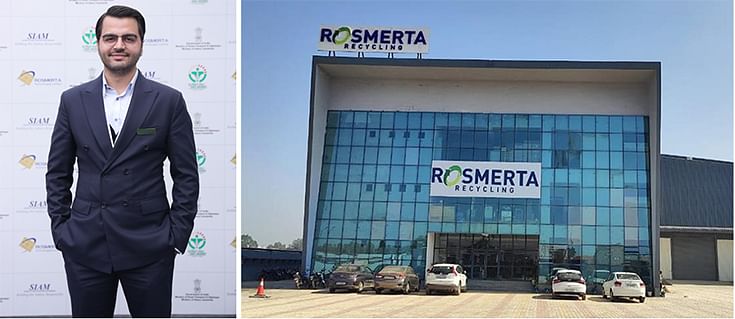Rosmerta Technologies targets up to 75% capacity utilisation of recycling facilities by FY2026
Gurugram-based company bullish on the potential of the upcoming Extended Producer Responsibility (EPR) norms to drive demand for organised vehicle recycling from OEMs operating in the Indian market.
Gurugram-based Rosmerta Technologies, a key player in the high-security registration plates, as well as automated driving test tracks categories in India, is bullish about growing demand for vehicle recycling services in the coming years.
The company, which set up its first vehicle recycling and scrapping facility (RVSF) in Manesar in October 2023, is targeting up to 75% capacity utilisation over the next two years. Rosmerta Recycling, its RVSF business vertical, is pinning its hope on the upcoming Extended Producer Responsibility or EPR norms that are set to make OEMs liable for proper dismantling, recycling, and scrapping of end-of-life vehicles (ELVs).
While Rosmerta Recycling currently is currently witnessing around 12-15% capacity utilisation at its 28,000-unit annual recycling capacity site in Manesar, the company says it plans to augment this level to 40% in FY2025, and reach 75% utilisation by FY2026, and hit break-even.
“We have doubled our utilisation every quarter so far this year (FY2024) and plan to do more than the combined volumes of Q1, Q2, and Q3 in the last quarter of FY2024,” Kartick Nagpal, President, Rosmerta Technologies, told Autocar Professional.

Kartick Nagpal: "We have doubled our utilisation every quarter so far this year (FY2024) and plan to do more than the combined Q1-Q2-Q3 volumes in Q4."
The company states while the demand levels are quite low at the moment, it will increase in the near future. “When the EPR kicks in, that is when we will see a sharp spike in demand for vehicle recycling,” said Nagpal. Rosmerta has earmarked a capex of Rs 200 crore to xpand to 10 centres by end-CY2025. While the company has invested Rs 10 crore in its maiden 70,000 square-feet RVSF in Manesar, it says it could lower its investment requirements with smaller centres in the future.
“Since it is a growing industry, the RoI is not there right now. However, the focus and thrust on sustainability is increasing across the automotive value chain, and with the government's draft EPR norms, as well as with the Certificate of Destruction (CoD) benefits coming into force, then there will be real RoI coming in,” Nagpal explained.
“We hope to break even on our investments at a centre-wise level in the next two years, and at the group-level in the next three years,” he said.
Expanding to 10 vehicle recycling facilities by CY2025, tying up with OEMs
With several policy reforms around vehicle scrappage coming in, the company says it is getting increasingly confident to open more RVSF centres in the coming years.
Rosmerta Recycling plans to venture into Himachal Pradesh, Gujarat, and Bengaluru with one centre each in FY24, and then open 6 more centres in FY26 in markets like Maharashtra, to reach a total of 10 RVSFs across key markets in India by end-CY2025.
“We are going to expand geographically with 9 new centres over the next two years, and are following markets based on policy implementation and their respective ELV parc. We are going aggressively into this direction,” added Nagpal.
“With the EPR norms, OEMs are looking to tie up with companies which have a reach of 10-15 RVSFs. That is our goal – to tie up with OEMs and help them with their EPR targets,” he added.
While direct customers comprise around 25% of the company's current recycling volumes, 35% comes from new- and used-car dealers. ELV auctions and enforcement drives are the other channels contributing to the company's inbound ELVs for recycling.
However, with the recent advent of organised vehicle recycling centres in India, the sector is facing a huge hurdle in terms of the well-established unorganised industry, which is able to offer a higher price for the ELV due to its lower processing cost of recycling, and non-conformance to standards like AIS-129.
According to Nagpal, “One of our key asks from the government, besides implementation of the CoD benefits, is stricter enforcement of laws against the unorganised players.
“Vehicle scrapping is a well-established business the world over, and is only happening in India now in an organised way. That is why all stakeholders, including the government, SIAM, and RVSFs must come together to make it viable. It is a sunrise sector, and offers strong growth potential over the next 15-20 years,” Nagpal signed off.
ALSO READ:
Rosmerta Technologies opens vehicle scrapping centre in Manesar
RELATED ARTICLES
Cosmo First diversifies into paint protection film and ceramic coatings
The Aurangabad, Maharashtra-based packaging materials supplier is leveraging its competencies in plastic films and speci...
JSW MG Motor India confident of selling 1,000 M9 electric MPVs in first year
The 5.2-metre-long, seven-seater luxury electric MPV, which will be locally assembled at the Halol plant in Gujarat, wil...
Modern Automotives targets 25% CAGR in forged components by FY2031, diversifies into e-3Ws
The Tier-1 component supplier of forged components such as connecting rods, crankshafts, tie-rods, and fork bridges to l...






 03 Feb 2024
03 Feb 2024
 14240 Views
14240 Views










 Autocar Professional Bureau
Autocar Professional Bureau




